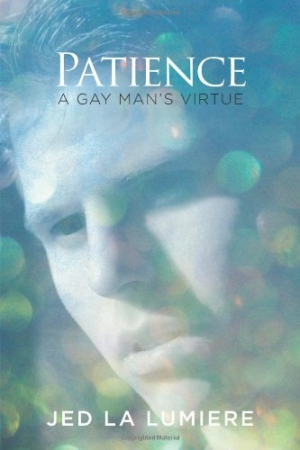Patience
A Gay Man's Virtue
With a generous dose of humor and a style that turns any reader into a confidante, Jed La Lumiere offers his own story about what it means to grow up gay in an environment rife with bigotry and still emerge as a compassionate, healthy individual.
From the start, La Lumiere adopts a light, conversational tone that creates a feeling of friendly interaction, as if Patience doubled as a long letter from a trusted friend. “I wrote this book as more of an active conversation between all of you and me,” he writes. “I want my readers to feel as if they’re participating in the book.”
His approach turns the book into a hybrid of sorts: part memoir, part inspirational self-help guide, and part call to action. La Lumiere’s intimate style—coupled with infectious optimism—creates cohesion and balance, allowing his material to shine even as he switches from one mode to the next.
Also acting as a unifying thread is the concept of patience, which La Lumiere chose as a title because he says the virtue is sometimes defined as “staying power or tolerance.” Gay people need an enormous amount of patience, he notes, because they’re living in a world that’s not necessarily ready for them. La Lumiere is baffled by such intolerance, but he believes that “with a good dose of hope and a great deal of patience, the situation will get better for gay people worldwide.”
For him to come to that perspective is admirable, given his high school years in a bigotry-infused small town. Although his early childhood was rife with feelings of being different, La Lumiere struggled most as an adolescent, in a place with a “backward, close-minded population.” After those difficulties, he chronicles coming out to his parents, his first romantic encounters, and exploring life as an openly gay man. And he details the freedom and sense of independence from his past that he gained by making physical and emotional changes.
As La Lumiere navigates the emotional complexity that comes with being a young adult (or being any age, really), he delivers thought-provoking insights about how a person can find his purpose and meaning in a society that tries to dictate behavior. “Personally, once I was able to stop summing myself up by the things that other people didn’t like about me or the boxes they placed me in, I was able to find the true me,” he writes. “The whole me. That was much better than the sum of the parts.”
La Lumiere’s exploration of identity, especially his enthusiasm for people expressing who they are, creates a standout book that will inspire anyone who could use a strong dose of hope and patience.
Reviewed by
Elizabeth Millard
Disclosure: This article is not an endorsement, but a review. The publisher of this book provided free copies of the book and paid a small fee to have their book reviewed by a professional reviewer. Foreword Reviews and Clarion Reviews make no guarantee that the publisher will receive a positive review. Foreword Magazine, Inc. is disclosing this in accordance with the Federal Trade Commission’s 16 CFR, Part 255.

